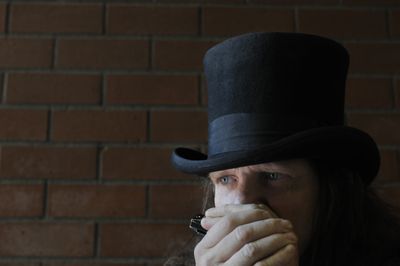Hillyard, family put live music in his soul

You may have heard of Harpman Hatter on the news or in print.
He argued a bit with downtown Spokane officials and fought for his right to entertain others on the streets of Spokane. Putting all that aside, the man behind the catchy name is Rick Bocook and he is a soul-stirring, harmonica-playing blues musician.
Bocook, 52, is not a gimmick. He didn’t just pick up a harmonica as a means of gathering the most coin from passers-by. He has been playing the harmonica for more than 30 years and is well-versed on style and sound.
He was born in Spokane and raised in the Hillyard area. His mother was a country western piano player in the 1960s. Back then, Hillyard was more of a railroad town and Bocook’s father would invite travelers to their home to play music into the night.
“I was constantly surrounded by live music,” said Bocook, who no doubt hummed along and drummed his fingers. He quickly picked up the ability to follow melodies. When he was 18, he picked up a harmonica on which he plays melody or leads. He started playing on Riverside in 1978 where he was often told to “move along.”
About four years ago, Bocook gave himself the name Harpman Hatter and donned a top hat. “It’s my First Amendment hat,” he said, “my street music hat.” And, like the naked guitar-playing cowboy in Times Square whom tourists often seek out, Bocook has become a familiar fixture in the downtown area.
“A time came when I was in extreme poverty,” he said. “I didn’t want to panhandle; I wanted to give something back and make people smile. The misconceptions from some people are that a person playing on the streets is just an upgraded panhandler. I say no, I don’t ask for money when I play, and would hope that the panhandler title goes away. It is like providing a service when you play on streets, a service that makes most people happy.”
He owns more than 20 harmonicas which, he said, have different sounds. He also travels with an amplifier. If you close your eyes when he plays, you can almost imagine you’re in New Orleans.
As Bocook plays, emotions seem to radiate from him. “My feelings come through the instrument – just watching the good times, the bad times, the moments of joy, the frustrations of people, doing or not doing their thing, whatever that may be.”
Bocook’s goal is to bring awareness to the street music scene and to be an advocate for musicians and the freedom of speech. “It’s hard to believe,” he said, “but many people don’t know their constitutional rights.” He carries a flier with him that states: “The ability to play a musical instrument or sing in a public place and solicit funds are forms of expression that are protected by the First Amendment.”
He also wants to help the community get stronger and to see more art, music and culture in the area. He applauds Doug Clark for beginning Spokane’s Street Music Week seven years ago.
Bocook has dreams of working as a session musician and uniting musicians by urging them to make their own venue, and he believes strongly in the universal language of music. “When playing the blues, it may sound sad, but what it does is lift your spirits up and take you out of the dumps. It does the same to other people when it touches them. Music and the arts help open people up, and gives them something to relate to.”